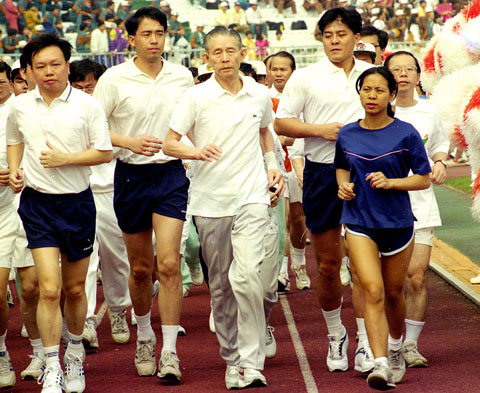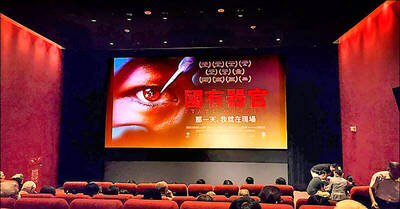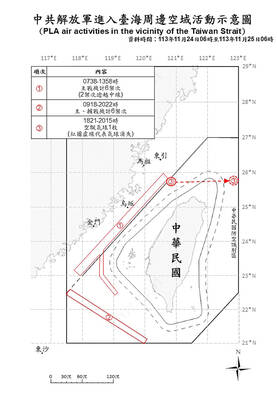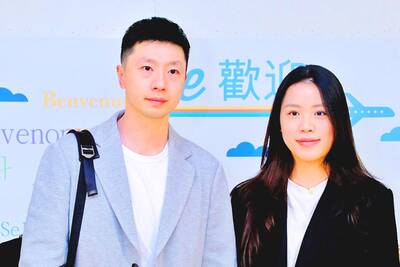He may have left billions of dollars, but what the business community will remember most about Wang Yung-ching (王永慶) was his business vision, pragmatism and the virtues of hard work and thrift.
“His contribution to the local economy is beyond words,” chairman of the Chinese National Association of Industry and Commerce (工商協進會) Theodore Huang (黃茂雄) said by phone yesterday.
“He was a very down-to-earth businessman and few in the local business community can live up to his achievements,” chairman of the General Chamber of Commerce (全國商業總會) Chang Ping-chao (張平沼) said.

PHOTO: CNA
Wang was surely the most successful businessman in Taiwan with only an elementary school diploma.
He was sent by his father to work as an apprentice at a rice shop in Chiayi at age 15, just after he had graduated from elementary school in 1932. He borrowed NT$200 from his father a year later and started his own rice shop. In 1954, he began a plastics business, which quickly expanded in the 1960s before becoming the world’s largest plastic manufacturer in 1980.
Huang had worked for Wang and highly admired his clear-cut style of management, while Chang was friends with the business tycoon despite their 23-year age difference.
Huang said that Wang would not hesitate to cut losses and close any subsidiaries if he found the businesses were not worth operating or unprofitable. On the contrary, Wang would dare to pump big money into investments he believed had good long-term prospects.
“He was a rationalist, who rejected waste of resources or money,” Huang said.
Chang said that Wang was “a man of words,” who would not break any promises to his business partners.
“What’s more, he was also a man of action,” Chang said, adding that Wang would address any urgent matters efficiently.
Wang’s success and management philosophy earned him the nickname “God of Business.”
His Formosa Plastics Group (台塑集團) has been ranked as the nation’s most profitable conglomerate since 2004, and made NT$219 billion (US$6.7 billion) in net profits last year, up from NT$161 billion in 2006, China Credit Information Service Ltd’s (CCIS, 中華徵信所) annual rankings showed.
The group was also the nation’s second-largest conglomerate by asset value and the only non-bank that made it into the top 10 list, with NT$2.46 trillion in total assets last year, an increase of NT$330 billion from the previous year, when it was ranked sixth, the credit agency’s report showed.
Formosa Plastic had also led in annual revenues in 2006, although its No. 1 spot was taken by Hon Hai Precision Industry Co (鴻海精密) last year.
Formosa Plastics was the only conglomerate that boosts its asset value through its earnings rather than by raising funds from shareholders in the open market, CCIS editor-in-chief Liu Jen (劉任) said.
Although he delegated his day-to-day management role at the firm to a decision-making team in 2005, Wang retained a final say in the group’s management, Liu said.
“Without Wang working as the arbiter, his seven-member team will now be facing a new challenge,” Liu said.
Liu said that he believed Wang’s death would have a limited impact on the business, since the team has been in charge of daily operations for almost four years. There may still be challenges ahead though, depending on how Wang’s family decide to divide up his fortune and businesses.
The group was also one of the agency’s top 10 “defensive”picks because of its outstanding liquidity, net worth and profitability that will give it an edge during the current financial crisis.
Wang was ranked on this year’s Forbes’ annual list as the nation’s second richest business tycoon with a fortune of US$6.8
billion, up almost 40 percent from last year’s US$4.9 billion.
His daughter, Cher Wang (王雪紅), and her husband, Chen Wen-chi (陳文琦), came in fifth, with combined assets of US$3.5 billion.
In spite of his wealth, what made Wang stand out was his thrift, he rarely spent money on luxury items and lived a simple life.
Chang said Wang was on a mission to help society and his employees and wasn’t that interested in making money.
Wang once told Chang: “I already have all the money I could possibly spend, but I have a responsibility and what I am working for is other people’s happiness.”

Theaters and institutions in Taiwan have received 28 threatening e-mails, including bomb threats, since a documentary critical of China began being screened across the nation last month, the National Security Bureau said yesterday. The actions are part of China’s attempts to undermine Taiwan’s sovereignty, it said. State Organs (國有器官) documents allegations that Chinese government officials engage in organ harvesting and other illegal activities. From last month to Friday last week, 28 incidents have been reported of theaters or institutions receiving threats, including bomb and shooting threats, if they did not stop showing the documentary, the bureau said. Although the threats were not carried out,

‘GRAY ZONE’ TACTICS: China continues to build up its military capacity while regularly deploying jets and warships around Taiwan, with the latest balloon spotted on Sunday The US is drawing up contingency plans for military deployments in Japan and the Philippines in case of a Taiwan emergency, Japan’s Kyodo news agency reported. They would be incorporated in a first joint operation plan to be formulated in December, Kyodo reported late on Sunday, citing sources familiar with Japan-US relations. A US Marine Corps regiment that possesses High Mobility Artillery Rocket Systems — a light multiple rocket launcher — would be deployed along the Nansei Island chain stretching from Kyushu to Yonaguni near Taiwan, Kyodo said. According to US military guidelines for dispatching marines in small formations to several locations,

The Mainland Affairs Council (MAC) yesterday confirmed that Chinese students visiting Taiwan at the invitation of the Ma Ying-jeou Foundation were almost all affiliated with the Chinese Communist Party (CCP). During yesterday’s meeting convened by the legislature’s Foreign Affairs and National Defense Committee, Democratic Progressive Party (DPP) Legislator Michelle Lin (林楚茵) asked whether the visit was a way to spread China’s so-called “united front” rhetoric, to which MAC Deputy Ministry Shen You-chung (沈有忠) responded with the CCP comment. The MAC noticed that the Chinese individuals visiting Taiwan, including those in sports, education, or religion, have had increasingly impressive backgrounds, demonstrating that the

As Taiwan celebrated its baseball team’s victory in the World Baseball Softball Confederation’s Premier12 on Sunday, how politicians referred to the team in their congratulatory messages reflected the nation’s political divide. Taiwan, competing under the name Chinese Taipei (中華台北隊), made history with its first-ever Premier12 championship after beating Japan 4-0 at the Tokyo Dome. Right after the game, President William Lai (賴清德) congratulated the team via a post on his Facebook page. Besides the players, Lai also lauded the team’s coaching and medical staff, and the fans cheering for them in Tokyo or watching the live broadcast, saying that “every